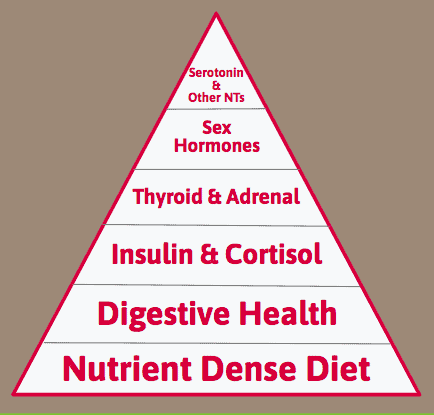Hormones control every single metabolic function from digestion to sugar balance, sleep and stress responses. When your hormones are haywire it can affect weight, mental & emotional stability, sleep, hair & skin quality and much more!
In Part 1 of Haywire to Happy Hormones, we explained specific ways a nutrient dense diet and digestive function impact hormone balance. In Part 2 we will take a look at the remaining factors in the pyramid below and what strategies in these areas can help your hormones go from haywire to happy!

Cortisol is a hormone produced in the adrenal glands and is regulated and released by the Hypothalamic Pituitary Adrenal (HPA) axis. Cortisol levels can affect almost every system in the body such as:
- Respiratory
- Reproductive
- Immune
- Musculoskeletal
- Nervous
- Cardiovascular
- Integumentary
- Gastrointestinal
- and more through its role in the stress response and the circadian rhythm!
When your cortisol levels are not balanced you can experience a variety of symptoms.
- weight gain or difficulty losing weight
- increased appetite
- sleep difficulties
- heart disease
- high blood pressure
- anxiety
- depression
- fatigue
- gastrointestinal upset like constipation, bloating, or diarrhea
- headache
- irritability
- problems with memory and concentration
- low libido
- irregular menstruation and ovulation
- Slow recovery from exercise
Emotional (anxiety, depression, relational issues), physical (responsibilities, infections, inflammation, illness or injury) and even spiritual stressors (anger, bitterness, fear, lust) that are chronic can lead to elevated cortisol levels. Overtime, elevated cortisol may lead to many health issues, including metabolic imbalances like type 2 diabetes, heart disease, sleep disturbances and weight gain. (8) To help regulate cortisol levels, managing stress is a key factor!
Getting adequate rest, deep breathing, not overtraining, maintaining healthy relationships, and even some adaptogenic herbs are all ways you can help balance cortisol levels naturally. Examples of some herbs that help modulate cortisol levels are Rhodiola, Ashwagandha, Asian Ginseng, and Holy Basil. (1) You can read more about ways to maintain balanced cortisol levels in our stress article!
How are cortisol and insulin related? Cortisol inhibits insulin secretion and therefore can disrupt insulin signaling. The pancreas produces insulin to help maintain balanced blood sugar. Your body secretes insulin, especially after meals, to direct the transfer of glucose from food into your liver, muscles, and fat cells for either energy or storage, depending on your body’s needs at that time. (8) The imbalance of insulin can contribute to metabolic imbalances such as metabolic syndrome, type 2 diabetes, and non-alcoholic fatty liver disease. You may experience the following symptoms if there is an insulin imbalance:
- shakiness or lightheadedness
- cravings for sweets or carbohydrates
- headaches
- irritability if meals are delayed
- mood swings
- brain fog
- fatigue or energy fluctuations
- unstable blood sugar levels
- increased thirst
- increased urination, especially at night
- blurry vision or vision changes
To help keep insulin balanced:
- Eat a low glycemic, whole nutrient dense diet such as a Mediterranean Diet
- Exercise (at least 150 min. per week)
- Balance microbiome (check out our article on GUT HEALTH)
- Manage stress (check out our article on STRESS)
- Get adequate sleep (check out our article on REST)
For additional information on the importance of insulin and the role it plays in the body check out our Not so Sweet article!
One of the main functions of the adrenal glands is the production of cortisol but also other hormones. These two little glands are hormone-producing powerhouses, making many different hormones that affect different body systems. The adrenal cortex has different layers and each layer makes a different hormone. (7)
| Part of Adrenal Gland | Hormone Produced | Area of the Body Affected |
| Zana fasciculata | Cortisol | Modulating inflammation, blood sugar, blood pressure and more! |
| Zana glomerulosa | Aldosterone | Regulates electrolytes (Sodium and Potassium) from being excreted or withheld from kidneys which in turn affects blood pressure |
| Zana reticularis | DHEA and other steroid hormones | Precursor to estrogen and testosterone |
| Adrenal medulla (inner part) | Epinephrine or norepinephrine | Ability to increase blood pressure, heart rate, muscular contraction of the heart to aid in blood sugar metabolism |
Living in a society where stress is high and constant, we often find that it is hard for our bodies to regulate stress effectively. When the body undergoes periods of pro-longed stress, the HPA axis activates in order to release hormones, including cortisol, to combat the stress.
The hypothalamus controls
- Temperature regulation
- Heart rate
- Mood
In response to stress releases a hormone to the pituitary gland.
The pituitary gland regulates
- Reproduction
- Growth
- Metabolism
Receives the hormone from the hypothalamus and, in response, releases its own hormone to the adrenal glands.
The adrenal glands receive the pituitary hormone and, in response, will begin releasing its own hormones to combat the stress. (7) There can be a miscommunication between the hypothalamus and adrenal glands, where the hypothalamus is not activating the HPA axis as it should. Micronutrient deficiencies and inflammation can also cause the HPA axis to be dysregulated and the following symptoms may occur:
- Fatigue
- “Tired but wired” feeling
- Mental fogginess
- “Brain fog”
- Weight gain in hips and stomach
- Poor sleep
- Increased cravings for sugar and salty foods
- Hormone imbalances
- Hair loss
- Weak nails
To support the HPA axis and overall adrenal function consuming a diet that supports blood sugar regulation is important. Focusing on quality fats and protein and fibrous foods is essential for blood sugar regulation. Vitamin D is also an important nutrient to support the HPA axis/adrenal regulation.

Adrenal function is often associated with thyroid function. Typically when one is not functioning optimally the other isn’t as well and both play a crucial role in hormone balance. “Thyroid hormones regulate the metabolic functions of literally every cell in the body-from brain chemistry to digestion.” (5) Maintaining optimal thyroid hormone levels are important to achieving and maintaining vibrant health. Thyroid hormones play a key role in the following areas:
| Area | Thyroid Function | Result |
| Stress | Optimal thyroid hormones | Needed to produce the adrenal hormones cortisol and DHEA |
| Immune System | Thyroid hormones regulate | Development and regulation of cells involved in immunity |
| Brain Function | Thyroid hormones stimulate and regulate | Action of Neurotransmitters such as serotonin, norepinephrine and GABA |
| Body Weight and metabolism | Thyroid hormones (too high or too low) | Slows conversion of glucose and fat into energy. Impairs production of HGH needed for lean muscle mass. |
| Digestion | Low levels of thyroid hormones or hyperthyroidism | -Constipation and slow production of stomach acid by depleting gastrin-Diarrhea or rapid transit time |
| Liver and Gallbladder function | Thyroid hormones | -Help liver and gallbladder function optimally which affect detoxification, hormone production and conversion of T4 to T3 |
| Blood Sugar Regulation | Thyroid hormones or Hypothyroidism | -Regulate the absorption of glucose into cells as well as elimination of excess glucose-Slowed the rate of absorption and elimination resulting in symptoms and hypoglycemia or dysglycemia |
Thyroid hormones need certain nutrients in order to be produced and regulated optimally. Focusing on a whole food diet is important for incorporating these nutrients but sometimes these nutrients need to be supplemented.
| Micronutrient | Thyroid Function | Food Sources |
| Iodine and Iron | Thyroid hormone synthesis | Iodine-seaweed, fish, egg, beef liver, chicken Iron- dark green leafy vegetables, raisin, seafood, red meat, liver, chicken |
| Selenium and Zinc | Conversion of T4 to T3 | Selenium- brazil nuts, macadamia nuts, hazelnuts Zinc- shellfish, meat, legumes, nuts |
Though the adrenal glands and thyroid are essential for hormone balance, most people think of sex hormones as the main hormones. Estrogen, testosterone and progesterone are all instrumental in sexuality and fertility but also so much more! We know that digestive health in terms of the microbiome relates to sex hormones. Mineral deficiencies, toxic environment, and detoxification pathways can also all play an important role in regulating sex hormones.
Estrogen is an important hormone that influences female reproduction, fat, cardiovascular health, bone turnover, and memory. It is reported that, “In addition to being made in the ovaries, adrenals, placenta, and fat tissue, estrogens are regulated by gut bacteria and obtained from environmental exposures. Liver health and genetics can also impact estrogen levels.” (9) Imbalanced estrogen symptoms includes:

- Acne
- Low libido
- Irregular periods
- Tender, swollen, or fibrocystic breasts
- Headaches
- Weight gain
- Hot flashes
- Endometriosis
- Fibroids
- Mood swings
- Polycystic ovarian syndrome (PCOS)
To help maintain balanced estrogen levels the following is recommended:
- Eat a balanced diet (high fibrous diet and including probiotic foods)
- Reduce alcohol and caffeine (due to liver burden and disrupts estrogen metabolism)
- Exercise
- Supplements when needed
- Reduce xenoestrogens (estrogen mimicking compounds, specifically the synthetic compounds)
Interested in finding out more about synthetic xenoestrogens? The Environmental Working Group has identified a list of chemicals and other substances that are known to disrupt our hormone balance and are most often found in:
- Plastics
- Food Packaging
- Cosmetics
- Water
- Cleaning Products
Similar to estrogen, progesterone can be affected by chemicals and environmental exposures. Progesterone is often known as the “pregnancy hormone” but it has so many other important factors. Progesterone is formed from cholesterol and though it does regulate pregnancy and menstruation it also plays a protective role in osteoporosis and in preventing nervous system disorders. (11)
| High Progesterone Symptoms | Low Progesterone Symptoms |
| Lower sexual interest | Abnormal uterine bleeding |
| Emotional eating/craving | Irregular/ missed periods |
| Frequent miscarriages | |
| PCOS | |
| High estrogen symptoms (lower sex drive, weight changes, gallbladder issues) | |
| Mood fluctuations |
The functional approach to looking at progesterone balance includes looking at lifestyle, diet, behaviors, and foundational support. Bioidentical Hormone Replacement Therapy (BHRT) or Hormone Therapy (HT) are two options that may be needed to support progesterone. Diet focused on whole organic foods, rich in vitamin B6 and zinc, exercising the right amount (avoiding overexercising), and reducing stress are all ways to naturally support progesterone balance.
Testosterone is essential for both men and women. It is responsible for producing both primary and secondary sex characteristics. Testosterone also induces the formation of red blood cells, affects muscle mass, energy, and endurance. In women, testosterone’s primary role is to convert into estradiol. When testosterone is too high or too low both males and females can have negative symptoms.
FEMALES:
| Low Testosterone | High Testosterone |
| Fatigue | Menstrual irregularities |
| Loss of muscle mass | Oily/acne prone skin |
| Poor concentration | Weight gain |
| Mood changes | Reduction in breast size |
| Mood swings | |
| Unwanted hair growth | |
| Infertility |
MALES:
| Low Testosterone | High Testosterone |
| Loss of muscle mass | Negative impact on cardiovascular system |
| Erectile dysfunction | Acne |
| Growth of fatty breast tissue | Insomnia |
| Low libido | Headaches |
| Infertility | Fluid Retention |
| Hot Flashes | Mood swings |
| Brittle bones | |
| Reduced body and facial hair |
In order to help keep testosterone levels balanced it is important to consume a diet with adequate zinc, vitamin D, magnesium and foods high in polyphenols (berries, herbs, spices, cacao, and nuts). Chronic stress has been shown to decrease testosterone production. Focusing on decreasing stress by either using adaptogenic herbs or stress reduction techniques can help with testosterone regulation. Lack of sleep can also lead to lower testosterone levels. As mentioned above, adequate sleep is essential for hormone balance.
When looking at hormones, here at Eureka!, we recommend completing Functional Lab Testing. Assessing hormone levels is the first step in restoring balance, but looking at the test results from a functional perspective looks at:
- How the body is actually using these hormones
- The ratios of hormones to each other
- Your symptoms
- Correlation between OPTIMAL levels vs. minimal levels
- Continue to monitor levels to Renew YOUR unique balance.
At Eureka! We use the Precision Analytical DUTCH hormone test panels to provide you with detailed information on how adrenal and sex hormones are being produced AND metabolized in the body. DUTCH stands for Dried Urine Test for Comprehensive Hormones.
In addition to measuring daily free cortisol levels (the amount of available cortisol circulating in the body), the DUTCH test also tells you about:
- Metabolized cortisol (the amount of cortisol the adrenals are producing or clearing)
- Sex hormone levels
- Whether phase I (hydroxylation) and phase II (methylation) of estrogen metabolism is good or poor
- If DHEA and testosterone are being pushed down the more androgenic pathways.
This test is a true functional picture of the entire endocrine system. Interested in having your hormones tested? Become a client here!
At Eureka! We look for the root cause, this is why we love the DUTCH test but also why we love hearing about YOUR symptoms and lifestyle. The personalized Hormone DRESS protocol is to help bring your hormones from haywire to happy! Using dietary support, suggestions for rest, exercise, stress management and supplementation when needed, we support hormones from formation to regulation.
Apply specific natural strategies DRESS (Diet, Rest, Exercise, Stress, Supplements) to support happy hormones by joining our Happy Hormones Protocol this month for only $40! Get started with the protocol here!
Resources:
- https://www.rupahealth.com/post/how-to-balance-cortisol-levels-naturally
- https://www.ifm.org/news-insights/balancing-thyroid-hormones-naturally/
- Eureka! Nutrition Course
- He S, Li H, Yu Z, Zhang F, Liang S, Liu H, Chen H, Lü M. The Gut Microbiome and Sex Hormone-Related Diseases. Front Microbiol. 2021 Sep 28;12:711137. doi: 10.3389/fmicb.2021.711137. PMID: 34650525; PMCID: PMC8506209.
- https://www.ifm.org/news-insights/womhorm-chronic-illnesses-menopause-role-nutrition/
- https://www.rupahealth.com/post/using-functional-nutrition-to-address-hormone-imbalances
- https://www.rupahealth.com/post/integrative-treatment-options-for-adrenal-disorders-specialty-testing-nutrition-supplements
- https://www.rupahealth.com/post/9-hormone-imbalances-that-can-hinder-weight-loss
- https://www.rupahealth.com/post/a-functional-medicine-approach-to-estrogen-imbalance
- https://www.rupahealth.com/post/testosterone-testing-101
